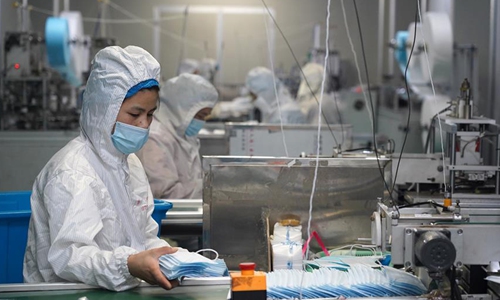Fiscal, monetary tools to help firms
Epidemic's economic impact limited; policies to boost growth: official

Workers make protective masks at the workshop of a company in Jinxian County, east China's Jiangxi Province, Feb. 1, 2020. To help fight the outbreak of pneumonia caused by novel coronavirus, workers of many medical material companies rushed to work ahead of schedule to make protective equipment. (Xinhua/Wan Xiang)
Chinese officials said on Friday that they have implemented fiscal and monetary policies to help the nationwide campaign against the novel coronavirus epidemic and implied that additional policy measures are forthcoming to help businesses and ensure stable economic growth.At a press briefing on Friday morning, senior officials from various economic agencies, including the Ministry of Finance (MOF) and the People's Bank of China (PBC), also sought to instill much needed confidence in the economy, saying that the negative impact of the epidemic on economic growth would be limited and that the world's second-largest economy remains resilient.
Since the outbreak of the deadly virus in the country, the MOF, along with other agencies, have rolled out more than 10 fiscal measures to support the battle, including allocating as much as 66.7 billion yuan ($9.6 billion) for a special fund to fight the epidemic, Yu Weiping, vice minister of finance, told the briefing.
Measures have also been taken to help healthcare workers and businesses that play a major role in the battle against the virus, including monetary assistance for the medical workers and discount loans for companies, Yu said.
While the campaign against the outbreak remains a top priority, concerns over its potential impact on economic activities are growing, as many businesses remain closed as part of the all-out efforts. Businesses involved in transportation, catering, lodging and tourism have been hit hard, especially small and medium-sized enterprises (SMEs).
"During the epidemic, companies that rely heavily on revenue to maintain operations will encounter huge difficulties. These companies' expenses, including rent, wages and loan payments, are rigid and cannot be cut off," said Tian Yun, vice director of the Beijing Economic Operation Association, adding that such difficulties could be "deadly" for SMEs.
Support measures have also been put in place to help these companies that face losses, including cuts to taxes and administrative fees and costs for raising funds, Yu said.
To ensure sufficient liquidity in the country's financial markets, the PBC has also taken a slew of measures in recent days, including injecting a total of 1.7 trillion yuan into the financial system earlier this week and setting up a 300 billion yuan special fund to refinance companies, Pan Gongsheng, deputy governor of the central bank, said at the briefing.
Measures have also been taken to expand financial support for SMEs, private businesses and factories, including increasing credit loans, medium to long-term loans and reducing costs for fundraising, Pan added.
"The universal belief is that the epidemic's impact will be temporary and limited and the Chinese economy will continue to show extremely strong resilience," Pan said, adding that the Chinese government still has "sufficient policy room" to stabilize economic growth.
Tian also said that it will be a fast process for China to mobilize efforts to boost consumption and investment and resume productivity. However, the key is whether affected SMEs will benefit from all the measures in a timely manner.
"This requires the use of our institutional strength to coordinate all agencies and sectors to implement the support measures through various means," he said, adding measures might also be needed to stabilize trade as imports and exports could be very difficult in the first quarter.
Guangzhou, South China's Guangdong Province, on Monday also announced 15 measures to help SMEs weather the hardship, including financial support, lowering rent, cutting taxes and administrative fees. Several other Chinese cities, including Suzhou in East China's Jiangsu Province, have released similar measures.




